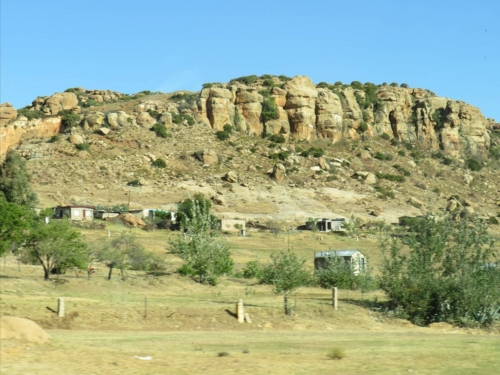Lesotho: The power of community leaders in HIV awareness and support

Improving HIV testing, disclosure and treatment for migrant communities
In the busy town of Maputsoe, in Lesotho on the border with South Africa, a hairdresser recounts how her engagement with an IOM change agent led to important shifts in her knowledge about family planning, provided pivotal counselling, and helped facilitate HIV testing and treatment for herself and her new boyfriend.
Now pregnant, Palesa, is aware of and accessing a prevention-of-mother-to-child-transmission (PMTCT) service and shares sexual and reproductive health and rights (SRHR) and HIV information and commodities with her own clientele.
She first learned about the SRHR-HIV Knows No Borders Project two years ago, through a door-to-door visit from one of the change agents, Thuso, a well-known counsellor, pastor and traditional healer. Thuso came to her small hair salon on multiple occasions, to provide her with information on SRHR, HIV and family planning. Palesa, 30, had a four-year-old daughter when she began a new relationship with Refiloe, a man she met in Maputsoe.
She had no plans to have more children but was unaware of locally available family planning options, and how to access services.
Palesa was reluctant to tell her boyfriend about her HIV positive status for fear he would no longer want to be with her. Thuso encouraged her to open up to him and offered to speak with the couple about the issue and provide any information they needed.
With Thuso’s support, they went for HIV testing, where Refiloe, to his surprise, also tested positive. The couple is still together and receiving treatment and support. Armed with her knowledge about SRHR-HIV issues Palesa began to reach out and share what she had learned with her friends and family.
She keeps a steady supply of condoms at her hairdressing salon to distribute to clients, with whom she also shares her experience. She acknowledges that many migrants passing through Maputsoe may not feel comfortable accessing formal health services for basic information about SRHR. Her salon, along with many others identified by the project in major border towns, have become hubs for delivering information, initiating referrals and distribution of condoms.
Engaging known leaders within the community helped build the rapport necessary when engaging with the multiple sensitive health and relationship issues that Palesa’s circumstances raised. The knowledge and support she received from the programme are now having ripple effects, as she continues to share what she learned.
IN A BOX
The SRHR-HIV Knows No Borders Project was launched in early 2017, as a collaborative effort between the International Organization of Migration (IOM), Save The Children (SC) Netherlands, and Witwatersrand School of Public Health (WSPH).
This consortium aims to implement a holistic, regional approach to improve sexual and reproductive health and HIV (SRH-HIV) related outcomes amongst migrants (including migrant adolescents, young people and sex workers) as well as non-migrant adolescents, young people and sex workers and others living in migration-affected communities in six countries in the Southern African Development Community (SADC) region, namely Eswatini, Lesotho, Malawi, Mozambique, South Africa and Zambia.
The project relies on community-based change agents who have been identified in collaboration with community leaders to promote sexual and reproductive health and HIV and assist individuals and communities to realise their rights and access basic services. By engaging known leaders within the community as change agents, the project has been able to build trust with individuals within the communities it aims to reach. This trust is particularly important when addressing sensitive issues such as SRHR and HIV.
*(all names have been changed in this story)
This story was written by Abibo Ngandu, IOM Southern Africa’s Public Information Officer.